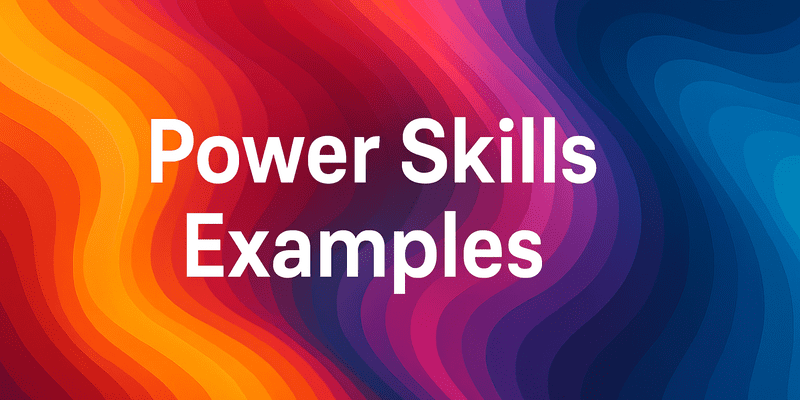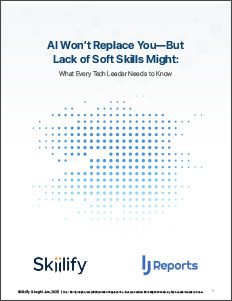Power Skills Examples: 5 Human Strengths Machines Can’t Match

Tim King offers 5 power skills examples; human strengths machines can’t match, based on proprietary research and a part of Solutions Review’s coverage on the human impact of AI.
As artificial intelligence rapidly reshapes the future of work, we find ourselves at a critical inflection point—one where technological advancement is no longer the greatest challenge. The real question now is: How do we remain distinctively human in a world increasingly driven by machines?
In boardrooms, classrooms, and conference calls, a quiet but powerful shift is underway. Technical skills are being automated. Tasks that once required years of experience are now performed in milliseconds by AI systems. But amid this rapid acceleration, a new class of skills has emerged—not as a consolation prize to automation, but as the very foundation of value creation in the future of work. These are power skills—the essential, deeply human capabilities that machines cannot replicate.

As AI handles more of the “how,” power skills define the “why” and the “who”—why we’re doing what we do, who it’s for, and who we become in the process. These skills shape the fabric of every meeting, every decision, every interaction that determines the health and success of an organization. And they are not confined to leaders. Power skills are needed at every level of the workforce—from interns to executives—because everyone is now navigating uncertainty, managing complexity, and interfacing with intelligent systems.
In our research on human readiness and the future of ethical, human-centered organizations, power skills stand out as the core of sustainable leadership, resilience, and trust (get the research by my team and I here). Whether you’re an individual looking to remain indispensable in a changing job market, or a leader aiming to build teams that can navigate transformation with grace and grit, this is the skill set that matters most.
Important: AI Won’t Replace You, But Lack of Soft Skills Might – Get Report
Power Skills Examples
Empathy & Relationship Building
Empathy is the cornerstone of human connection. It’s the ability to understand and share the feelings of others, and it powers effective leadership, customer service, and teamwork. Closely related is emotional intelligence (EQ)—the ability to recognize, regulate, and respond to emotions in yourself and others. In high-functioning teams, EQ often trumps IQ.
Active listening is another essential power skill: the practice of fully concentrating on what others are saying without judgment or interruption. It builds psychological safety and ensures that decisions are informed by real understanding. In today’s global work environment, cross-cultural competence is vital too—helping professionals navigate and respect cultural differences in communication, expectations, and values. Lastly, conflict resolution enables individuals to defuse tension, mediate disputes, and restore collaboration with grace and fairness.
- Emotional Intelligence (EQ)
- Cross-Cultural Competence
- Conflict Resolution
Communication & Influence
In an era where attention is scarce and noise is constant, communication is everything. Persuasive communication involves presenting ideas in a way that motivates action and builds alignment. Storytelling—often overlooked—is a powerful form of influence, turning data and decisions into memorable, human narratives.
Public speaking remains one of the most feared and valuable professional skills. The ability to convey ideas clearly to live or virtual audiences can elevate leaders and inspire teams. Similarly, constructive feedback—delivered with clarity and care—helps teams grow without defensiveness or disengagement.
- Persuasive Communication
- Storytelling
- Constructive Feedback
Critical Thinking & Adaptability
Technical tools may automate tasks, but it takes systems thinking to understand how those tasks fit into the broader landscape. This power skill enables professionals to recognize interconnectedness, predict ripple effects, and make holistic decisions.
In uncertain environments, judgment under uncertainty becomes critical: the ability to make informed choices when data is incomplete or rapidly shifting. Adaptability is the natural partner to this skill, reflecting a person’s capacity to embrace change and evolve their mindset. The related concept of learning agility—how quickly someone can learn and apply new information—is perhaps the most future-proof skill of all. And in a world of pressure and burnout, resilience—the ability to bounce back from adversity—is more than just a buzzword. It’s a survival trait.
- Systems Thinking
- Judgment Under Uncertainty
- Adaptability
- Learning Agility
- Resilience
Collaboration & Leadership
No AI system can replace the nuances of human collaboration. Collaboration itself is a power skill, especially in cross-functional, remote, or hybrid teams. It relies on trust, shared ownership, and communication.
Team empowerment takes collaboration to the next level. It’s about lifting others up, recognizing strengths, and creating a safe space for contribution. Delegation, meanwhile, ensures that work is distributed effectively, with the right balance of oversight and autonomy. In many modern organizations, influence matters more than authority—which is why influence without authority is such a prized skill. Those who can lead from any seat in the room create momentum and change without relying on positional power. And for those further along in their journey, mentorship offers a way to invest in others, transmit values, and shape the next generation of leaders.
- Collaboration
- Team empowerment
- Delegation
- Influence without authority
- Mentorship
Ethics, Purpose & Self-Leadership
Machines operate on logic. Humans operate on values. That’s why ethical reasoning is such an indispensable power skill. It involves weighing fairness, long-term consequences, and stakeholder impact in decision-making. It’s what separates automation from wisdom.
Self-awareness sits at the heart of all personal growth: knowing your own triggers, tendencies, and blind spots so you can lead yourself and others better. Purpose-driven mindset is another power skill that helps professionals stay grounded and motivated, especially during volatility or ambiguity. With competing demands and constant distractions, time prioritization becomes critical: the ability to focus not just on what’s urgent, but what’s truly important. None of this works without self-motivation, which fuels consistency and forward motion even when no one is watching. Finally, accountability—the willingness to own your outcomes and take responsibility—builds credibility and trust over time.
- Ethical Reasoning
- Self-Awareness
- Purpose-Driven Mindset
- Time Prioritization
- Self-Motivation
- Accountability
Reframing ‘Soft Skills’ As Power Skills Examples
Power skills are not just about emotional intelligence or communication—they represent the human differentiators that AI can’t replace. They are the skills that help organizations earn trust, navigate disruption, and grow with integrity. They are how we future-proof our people and our leadership.
At a time when AI is transforming how we work, these five power skills represent what makes us irreplaceably human.
We’re currently conducting a follow-up study to deepen our understanding of the human-AI skills gap—and we need your input.
📝 Take the survey now to contribute your perspective and help define the next wave of workforce readiness.
Note: These insights were informed through web research and generative AI tools. Solutions Review editors use a multi-prompt approach and model overlay to optimize content for relevance and utility.



